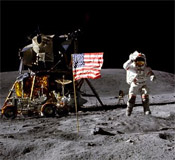United States National Aeronautics and Space Administration

United States National Aeronautics and Space Administration: Publications
Document Type
Article
Date of this Version
2009
Citation
Journal of Plant Nutrition, 32: 318–334, 2009
Abstract
Nutrient recycling in a space-based Bioregenerative Life Support System (BLSS) will require an understanding of nutrient dosage effects on crop production, plant tissue partitioning, and geochemical fates within crop systems. Sodium (Na+), fluoride (F−), and iodide (I−) are found in human waste streams. These elements were examined using crops in hydroponic systems. Lettuce, radish, spinach, and beet were used to study Na+ uptake and tolerance. Spinach, lettuce, and radish growth were inhibited at 8.0 × 10−2 M Na+ compared to the control. Beet growth improved at 2.0 and 4.0 × 10−2 M Na+ compared to the control. Rice plants were used to study F− and I− uptake and tolerance. Rice growth was inhibited at 5.0 × 10−4 M F− and at 5.0 × 10−6 M I−. Solution redox and sorption reactions were predicted with the aid of a chemical equilibrium model. A simulation model was used to predict element fates.


Comments
U.S. Government Work